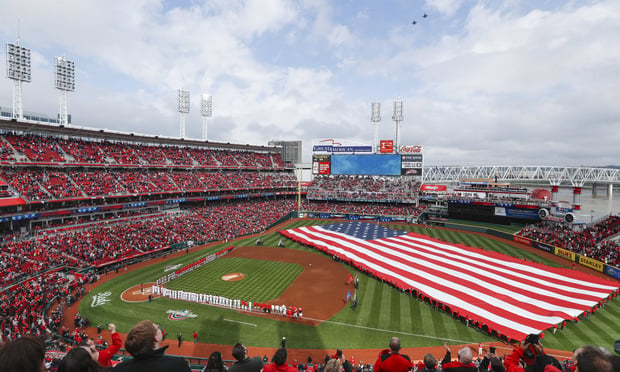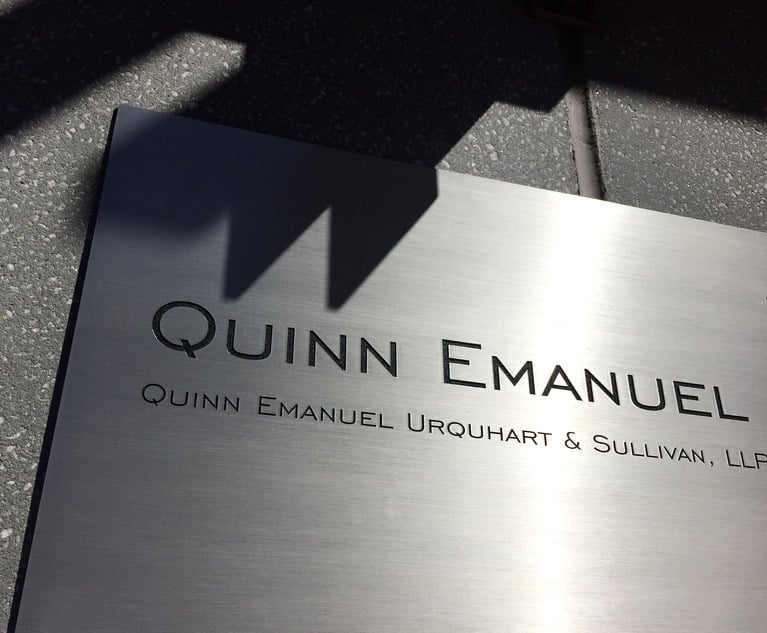Baseball Season's Beginning Unveils Bullpen of Legal Billers
While snow and other inclement weather in certain parts of the country scuttled the home openers of several Major League Baseball teams, the league's player's union marked the start of a new league year with a filing listing a long lineup of legal bills.
April 06, 2018 at 06:46 PM
7 minute read

Major League Baseball's 2018 season started earlier than usual this year, with Opening Day occurring on March 29, and rain, snow and other inclement weather in certain parts of the country scuttling a spate of games.
The legal bills, however, are weather-resistant. The Major League Baseball Players Association made its annual LM-2 filing with the U.S. Department of Labor on April 2, and the document itemizes the New York-based labor union's various expenses between Jan. 1, 2017, and Dec. 31 of that year.
As in years past, law firms once again earned significant sums from an organization that collectively bargains with the league on behalf of players. At least 10 firms led by McCarter & English ($256,897), Sidley Austin ($163,113) and San Francisco-based Altshuler Berzon ($167,191) are among the top recipients of MLBPA funds.
Other firms receiving payments from the union include Bordentown, New Jersey-based Jeff Fannell & Associates ($260,282); Boston-based Hemenway & Barnes ($66,132); Washington, D.C.'s Groom Law Group ($56,399); Winston & Strawn ($32,854); Winston-Salem, North Carolina-based Enns & Archer ($24,090); Hackettstown, New Jersey-based Margolin & Neuner ($23,625); and Washington, D.C.'s Bredhoff & Kaiser ($14,061).
McCarter & English, Sidley and Winston & Strawn all have long histories handling a variety of litigation and labor and employment work for the MLBPA, as do other smaller firms such as Fannell's, which is led by a former assistant general counsel for the union. On the labor front, 2017 was relatively quiet for the MLBPA and the league, whose commissioner is former Morgan, Lewis & Bockius labor and employment litigator Robert Manfred Jr.
Both sides finalized a new labor deal in December 2016, but a recent offseason that saw a number of key free agents go unsigned until spring training, as well as setbacks for minor league players claiming to seek more equitable compensation from team owners have many observers already looking ahead to the next round of collective bargaining negotiations. (Minor league players, however, are not part of the MLBPA.)
Earlier this week, MLB executive director Anthony Clark, himself a former player, spoke publicly about a system that his constituency believes has suppressed salaries as a number of franchises appear to be unconcerned about fielding competitive teams. The MLBPA's LM-2 reveals that Clark, for his work leading what some believe to be one of America's strongest unions, received more than $2.2 million last year.
Clark took over leadership of the union December 2013 after the death of his predecessor, Harvard Law School graduate and former MLBPA general counsel Michael Weiner. The latter, who died at 51 after a fight with brain cancer, inherited the top MLBPA job following the 2009 retirement of longtime leader Donald Fehr, a labor lawyer and veteran of the union's years of collective bargaining battles with the league.
Fehr, now head of the National Hockey League Players Association, received $112,221 in pension and retirement benefits from the MLBPA in 2017, according to its LM-2 filing. David Prouty, promoted to general counsel at the union in 2013, was paid $461,515 last year. Prouty's compensation was supplemented with another $160,993 he received for outside legal work after he was replaced as general counsel last summer by senior labor counsel Ian Penny. The rationale for the general counsel switch was attributed to a natural time for the union to transition after reaching a new labor deal with the league.
The departure of Prouty, who will continue to serve as an outside consultant and adviser to the union, coincided with the promotion of assistant general counsel Matthew Nussbaum to deputy general counsel. Nussbaum took home $526,034 in total compensation last year from the MLBPA, while Penny received $679,136.
Other in-house lawyers on the union's payroll include chief of business affairs Timothy Slavin ($616,347); assistant general counsel Robert Lenaghan ($562,437), Heather Chase ($319,226), Robert Guerra ($221,599) and Jeffrey Perconte ($114,491); staff counsel Gregory Dreyfuss ($167,086); and counsel Rachel Luba ($17,644).
Luba was hired in September after working at Farrell & Reisinger, a Pittsburgh-based firm formed by Big Law refugees that has represented some of baseball's biggest stars. Perconte, a former federal prosecutor and ex-partner at Drinker Biddle & Reath in Chicago, was hired by the MLBPA in October. The union's LM-2 states that Perconte also received $5,120 for prepaid baseball tickets. Clark, Prouty and other MLBPA employees received similar sums for tickets.
Richard “Rick” Shapiro, an attorney and senior arbitration adviser to the MLBPA, took home another $839,420, while Kevin McGuiness, a lawyer and lobbyist hired by the union as COO in 2014, received $702,625 in his role last year. Lou Melendez, a former in-house lawyer and international operations executive with MLB who retired from the league in 2012, was paid $160,968 by the union for World Baseball Classic-related consulting work.
Then there are the salary arbitrators, those individuals who preside over proceedings designed to resolve disputes between teams and players over compensation and benefits. These baseball or pendulum arbitrations are handled by certified arbitrators bound by the collective bargaining agreement between the MLBPA and the league office, which represents the interests of MLB's 30 teams.
Frederic Horowitz, who in recent years has been the top arbitrator in baseball, was officially deposed from that role in 2017 after being fired by the union in late 2016 as a result of a ruling he made in a case involving former Los Angeles Dodgers infielder Charlie Culberson. Horowitz, not the first arbitrator to be cast aside in the labor battleground between players and management, earned $25,200 from the MLBPA last year. Mark Irvings, who was picked to replace Horowitz as permanent arbitrator, was the only other neutral to top Horowitz in earnings last year, taking in $29,272 for his efforts.
Other arbitrators receiving payments from the MLBPA in 2017 were Robert Herzog ($15,324); Sylvia Skratek ($13,248); Steven Wolf ($12,794); Andrew Strongin ($12,569); Daniel Brent ($11,878); Mark Burstein ($11,010); Elizabeth Neumeier ($9,864); Gil Vernon ($9,802); James Oldham ($9,611); Gary Kendellen ($9,540); Jeanne Wood ($7,796); Edna Francis ($6,876); and Dennis Archer ($5,056). Archer, a former Detroit mayor honored as a Lifetime Achiever by The American Lawyer in 2009, serves as chairman emeritus at Dickinson Wright.
Notre Dame Law School maintains a baseball arbitration database that includes charts, data and other information. The first collective bargaining agreement between the league and players was signed in 1968. Marvin Miller, the MLBPA's first leader and a legendary figure in labor law, died in 2012.
This content has been archived. It is available through our partners, LexisNexis® and Bloomberg Law.
To view this content, please continue to their sites.
Not a Lexis Subscriber?
Subscribe Now
Not a Bloomberg Law Subscriber?
Subscribe Now
NOT FOR REPRINT
© 2025 ALM Global, LLC, All Rights Reserved. Request academic re-use from www.copyright.com. All other uses, submit a request to [email protected]. For more information visit Asset & Logo Licensing.
You Might Like
View All
Saul Ewing Loses Two Partners to Fox Rothschild, Marking Four Fla. Partner Exits in Last 13 Months
3 minute read
Willkie Adds Five-Lawyer Team From Quinn Emanuel in Germany

Dentons Taps D.C. Capital Markets Attorney for New US Managing Partner

Exceptional Growth Becoming the Rule? Demand Drove Strong Year for Big Law
Trending Stories
- 1We Must Uphold the Rights of Immigrant Students
- 2Orrick Picks Up 13-Lawyer Tech, VC Group From Gunderson Dettmer
- 3How Alzheimer’s and Other Cognitive Diseases Affect Guardianship, POAs and Estate Planning
- 4How Lower Courts Are Interpreting Justices' Decision in 'Muldrow v. City of St. Louis'
- 5Phantom Income/Retained Earnings and the Potential for Inflated Support
Who Got The Work
J. Brugh Lower of Gibbons has entered an appearance for industrial equipment supplier Devco Corporation in a pending trademark infringement lawsuit. The suit, accusing the defendant of selling knock-off Graco products, was filed Dec. 18 in New Jersey District Court by Rivkin Radler on behalf of Graco Inc. and Graco Minnesota. The case, assigned to U.S. District Judge Zahid N. Quraishi, is 3:24-cv-11294, Graco Inc. et al v. Devco Corporation.
Who Got The Work
Rebecca Maller-Stein and Kent A. Yalowitz of Arnold & Porter Kaye Scholer have entered their appearances for Hanaco Venture Capital and its executives, Lior Prosor and David Frankel, in a pending securities lawsuit. The action, filed on Dec. 24 in New York Southern District Court by Zell, Aron & Co. on behalf of Goldeneye Advisors, accuses the defendants of negligently and fraudulently managing the plaintiff's $1 million investment. The case, assigned to U.S. District Judge Vernon S. Broderick, is 1:24-cv-09918, Goldeneye Advisors, LLC v. Hanaco Venture Capital, Ltd. et al.
Who Got The Work
Attorneys from A&O Shearman has stepped in as defense counsel for Toronto-Dominion Bank and other defendants in a pending securities class action. The suit, filed Dec. 11 in New York Southern District Court by Bleichmar Fonti & Auld, accuses the defendants of concealing the bank's 'pervasive' deficiencies in regards to its compliance with the Bank Secrecy Act and the quality of its anti-money laundering controls. The case, assigned to U.S. District Judge Arun Subramanian, is 1:24-cv-09445, Gonzalez v. The Toronto-Dominion Bank et al.
Who Got The Work
Crown Castle International, a Pennsylvania company providing shared communications infrastructure, has turned to Luke D. Wolf of Gordon Rees Scully Mansukhani to fend off a pending breach-of-contract lawsuit. The court action, filed Nov. 25 in Michigan Eastern District Court by Hooper Hathaway PC on behalf of The Town Residences LLC, accuses Crown Castle of failing to transfer approximately $30,000 in utility payments from T-Mobile in breach of a roof-top lease and assignment agreement. The case, assigned to U.S. District Judge Susan K. Declercq, is 2:24-cv-13131, The Town Residences LLC v. T-Mobile US, Inc. et al.
Who Got The Work
Wilfred P. Coronato and Daniel M. Schwartz of McCarter & English have stepped in as defense counsel to Electrolux Home Products Inc. in a pending product liability lawsuit. The court action, filed Nov. 26 in New York Eastern District Court by Poulos Lopiccolo PC and Nagel Rice LLP on behalf of David Stern, alleges that the defendant's refrigerators’ drawers and shelving repeatedly break and fall apart within months after purchase. The case, assigned to U.S. District Judge Joan M. Azrack, is 2:24-cv-08204, Stern v. Electrolux Home Products, Inc.
Featured Firms
Law Offices of Gary Martin Hays & Associates, P.C.
(470) 294-1674
Law Offices of Mark E. Salomone
(857) 444-6468
Smith & Hassler
(713) 739-1250










